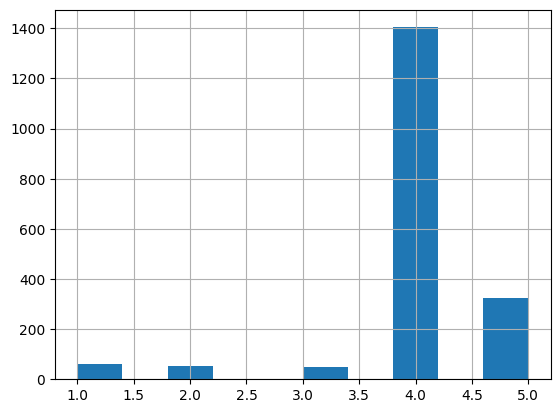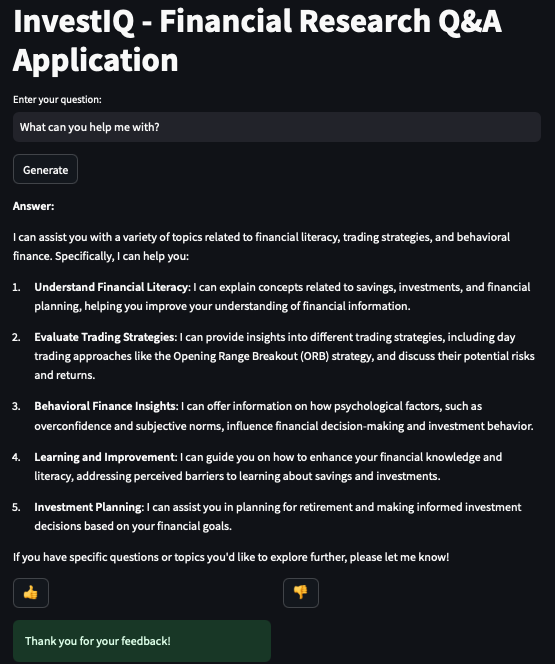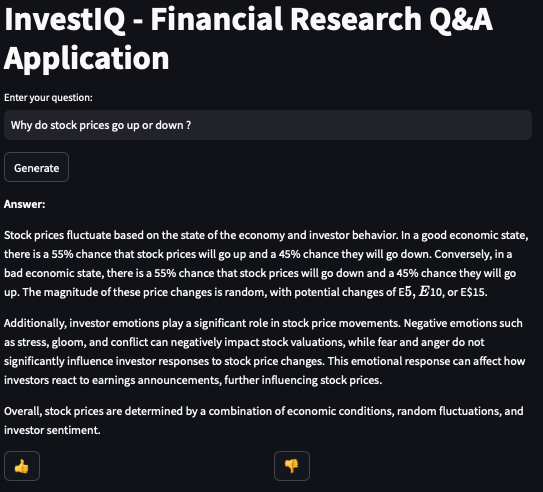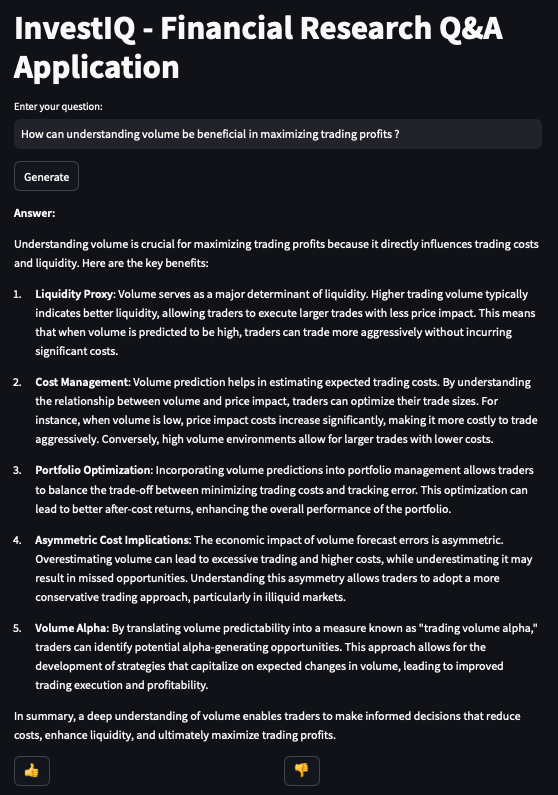A comprehensive Question and Answer application powered by Retrieval-Augmented Generation (RAG), leveraging a knowledge base of financial research papers. This project allows users to ask questions related to trading strategies and behavioral finance and receive accurate, context-aware answers.
In the rapidly evolving field of finance, staying updated with the latest research is crucial. This application bridges the gap by providing a user-friendly interface to query a curated knowledge base of financial research papers. Utilizing NLP techniques and large language models (LLMs), the app delivers precise answers to user questions, enhancing accessibility to complex financial insights.
- Data Ingestion: Research papers are preprocessed, chunked, and embedded using domain-specific embedding models.
- Indexing: Processed data is indexed in Elasticsearch for efficient retrieval.
- User Interface: A Streamlit app provides an interactive front-end for users to submit questions.
- RAG Pipeline:
- Query Processing: User questions are embedded and used to retrieve relevant documents using hybrid search with re-ranking.
- Prompt Construction: Retrieved documents are combined with the question to form a prompt.
- Answer Generation: An LLM generates the answer based on the prompt.
- Feedback Loop: User feedback is collected and stored for future improvements.
- Programming Language: Python 3.10
- Front-end: Streamlit
- Back-end:
- Language Models: OpenAI GPT-4o-mini (also tested GPT-4o and GPT-3.5 Turbo)
- Embedding Models: Sentence Transformers (all-MiniLM-L6-v2, FinLang/finance-embeddings-investopedia, philschmid/bge-base-financial-matryoshka)
- Databases:
- Elasticsearch: For text search and retrieval
- PostgreSQL: For storing conversations and feedback
- Containerization: Docker & Docker Compose
- Others:
- Psycopg2: PostgreSQL adapter for Python
- Elasticsearch Python Client
- OpenAI Python SDK
We conducted extensive testing of the retrieval component to ensure the most relevant documents are fetched for answer generation.
- Simple Keyword Search: Utilizes basic keyword matching to retrieve documents.
- Hybrid Search: Combines keyword search with vector similarity using embeddings.
- Re-ranking with Parameter Tuning: Applies re-ranking algorithms to improve the ordering of retrieved documents, adjusting parameters to optimize performance.
- LLM-Assisted Question Generation: For each chunk of the research papers, we used an LLM to generate 5 questions that the chunk could answer. (check exploratory
here)
- We assessed the quality of the answers produced by the RAG pipeline using the retrieved documents.
- Hit Rate: Measures the proportion of times the relevant document appeared in the top N retrieved documents.
- Mean Reciprocal Rank (MRR): Evaluates how high the first relevant document ranks in the list of retrieved documents.
- Relevancy Calculation Using Similarity Scores: Computes the cosine similarity between the embeddings of the retrieved documents and the query.
- Relevancy Calculation Using LLM as a Judge:
- Method: The LLM compares the generated answer with the reference answer (from the ground truth dataset) and provides a relevancy score.
- Hit rate : 0.79
- MRR : 0.49
Several iterations were tried to improve the metrics either by tweaking the re-ranking parameters, or parameters of keyword search and semantic search, also trying different sentence transformers (Check
here.).
- Relevancy scores distribution after using LLM as a judge:
- Scoring Guidelines for LLM as a judge:
- 5: The RAG-generated answer is completely correct, fully addresses the question, and is as comprehensive as the reference answer.
- 4: The answer is correct but may lack minor details compared to the reference.
- 3: The answer is partially correct but misses significant details.
- 2: The answer has some correct elements but contains notable inaccuracies.
- 1: The answer is incorrect or irrelevant to the question.

Docker and Docker Compose installed on your machine. An OpenAI API Key. Sign up at OpenAI to obtain one.
- Clone the Repository :
git clone https://github.com/yourusername/investiq-qna-rag.git
cd investiq-qna-rag- Set Up Environment Variables : Create a .env file in the root directory with the following content:
# PostgreSQL Configuration
DB_HOST=db
DB_PORT=5432
DB_NAME=your_database_name
DB_USER=your_username
DB_PASSWORD=your_password
# Elasticsearch Configuration
ELASTICSEARCH_HOST=elasticsearch
ELASTICSEARCH_PORT=9200
# OpenAI API Key
OPENAI_API_KEY=your_openai_api_keyNote: Replace the placeholders with your actual credentials.
-
Prepare Data : Place your financial research papers (PDF format) in the data/ directory.
-
Build and Run the Application : Use Docker Compose to build and start all services:
docker-compose up --build- Access the Application : Open your web browser and navigate to:
http://localhost:8501
- Enter your question in the input box provided.
- Click the "Generate" button to receive an answer.
- After receiving an answer, use the 👍 or 👎 buttons to provide feedback.
- Your feedback helps improve the accuracy and relevance of future answers.
- Implement Grafana dashboard, metrics are already being captured in the tables.
- Expand Knowledge Base: Incorporate more research papers and update regularly to include the latest studies.
- Fine-Tune Models: Train domain-specific language models to improve accuracy and reduce dependency on external APIs.
- Optimize Retrieval: Explore advanced retrieval techniques, such as neural search and contextual embeddings.
- Integrate company reports, Warren Buffett letters and other literature of the same kind; and eventually generating a dashboard which picks up a stock fundamentals and scores wether to Buy/Sell/Hold.
- Full-Stack Development: Integrating front-end and back-end components with containerization.
We welcome contributions from the community! Fork the Repository, Clone Your Fork, Create a New Branch, Implement your feature or fix, Commit, Push and finally create a Pull Request
Thank you for checking out this project!


